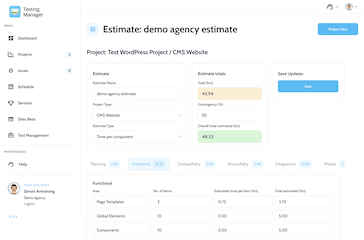
There are many good reasons to test websites and some of them get overlooked in the rush to launch a new site or give it a refresh.
Often little or no testing is done and this can have a big impact on how well received your new website is, how successful it becomes and whether it meets the expectations you had for it.
Testing your website thoroughly is vital and here are 12 good reasons why:
Sounds obvious but there are often simple errors that are just not picked up before a website launches or even once it has been online for a while. Simple things like broken links, images not loading, search functions not working, forms not submitting correctly are all common problems that a little testing can find and enable you to fix.
These basic quality errors can have a big impact on your business but are generally pretty straightforward to solve.
Keeping up to date on the latest major web browsers and versions is important, as new browsers and browser versions are released regularly and other browsers gain in popularity. Browsers use different rendering engines from one another that are used to display web pages, they don't all support the same CSS3 properties and so the same page can look different in 2 different browsers.
A test of your website in each major web browser can uncover issues that may be affecting a number of users. We've written about browser testing before in our website audits post on breaking down browser compatibility.
Mobile web browsing has increased dramatically over the past few years. It is a necessity to make sure that your website can be viewed correctly on each of the main mobile devices and operating system versions.
For example, in our testing we test websites on the latest 2 major versions of both iOS and Android. We also test across iPhone and iPad size devices as well as Android smartphone and Android tablet devices. We'll also check the site in both portrait and landscape orientations.
Doing this catches a lot of issues where elements may not stack correctly or be positioned off the screen, sometimes introducing a sideways scroll and sometimes just not visible or reachable at all. Buy now buttons off the bottom or side of the screen can be a big problem for ecommerce sites, for example.
Having an idea of how your website displays on each major mobile device will determine whether there is more work to do in order to make your site fully usable on a mobile.
Web standards is a subject often discussed but there are benefits to be had from getting your site to comply with them.
For one, websites that pass HTML and CSS validation are generally displayed more consistently across different web and mobile browsers. This means less browser related problems and less frustration for your users.
Passing web standards also often means a more accessible, user friendly website and one that Google prefers and so it has a greater opportunity to rank better.
Accessibility is often in the news but not for positive reasons, as organisations such as RNIB will take companies to court over the poor accessibility of their websites. It is a legal obligation under UK law to make sure that your website is accessible and you could be sued for discrimination if it is not.
There are many tools to help with accessibility testing but you should also try using your website without a mouse, or with a screen reader or text browser to see if you can still carry out the actions that you expect. We covered auditing your website's accessibility last year.
We know that users do not like slow websites. We also know that Google isn't keen on slow websites. Therefore, it makes sense to invest a bit of time and effort to check your website's performance.
Your website's performance isn't just down to your hosting company. The way your website is coded, the graphics and images used and a number of other factors can all help to increase load times and slow your website down.
Running a series of performance checks can identify where precious seconds can be saved and give your users a better experience. Here are 21 website performance testing tools to get you started.
Users are why you have a website in the first place. You want those users to visit the website and carry out a series of actions such as read and understand the information you provide, make contact with your organisation, browse and buy products, sign up to your product or service, etc. So gaining feedback from your target audience is vital for a successful website. Testing your users can find out what they like and what they are finding frustrating or even impossible regarding your website.
As few as 5 users can identify severe issues that, once overcome, will provide an improved experience for your users and allow them to complete the actions that were frustrating them previously. You can start a user experience test straightaway with UserLytics, or UXTweak, both of them are Usability Testing and UX research platforms.
A common aspect of website testing is trying to improve your conversion rates through A/B or multivariate testing, which aims to gain more signups, sales or enquiries from the same number of visitors. Whatever the action is that you would like more of your users to complete - whether that is signing up for a demo of your product, adding a product to the basket or cart, filling in an enquiry form, etc.
This is achieved by testing different versions of your landing pages to determine which one converts best and then going with that version. It is an ongoing cycle of making improvements, testing, assessing results, making more improvements, testing again, etc.
Regular testing of different promotions, button styles, page layouts, positioning of elements, copy, images, forms with less fields, etc. can improve your conversion rates and help you to achieve more out of the same visitor levels.
Issues for SEO can easily be introduced to a website without you realising. You can break links, create duplicate content, set up new pages without writing individual page titles, not update your site map and a number of other hidden problems. These only become apparent when you start to lose visitors to your site.
A regular check of all the main SEO aspects will keep everything ticking over and ensure search engines still appreciate your website, can index all the pages and you are not falling foul of any Google gotchas.
An installation of Google Analytics or other web analytics tools can often not be carried out correctly. Sometimes the code is missing from certain pages or cross domain problems are not dealt with properly. This can result in page views being inflated or deflated or bounce stats being incorrect.
If you have goal conversions or specific events set up then making sure those are working correctly helps to make sure that the stats reported is 100% correct. Nobody wants to report a large number of conversions only to find out the conversion tracking went a bit wobbly and those conversions didn't actually happen.
An audit of your Google Analytics can uncover these problems so that you can ensure you are measuring your visitor statistics correctly.
Nobody likes spelling errors when viewing a website, even minor ones. It gives a bad impression of the business overall. But when you've read every word on every page of your own site several times over it can be hard to see the wood for the trees.
A regular spelling and grammar check across the whole of your website helps to eradicate any errors that creep in from time to time and make sure everything is double checked.
There are many unscrupulous individuals out there who like nothing more than exploiting your website by trying different ways to hack into it. They want to use your website or server for nefarious activities such as gaining access to your data or adding in code to your website to distribute viruses, link to other sites or even replace your site with their own (note - it will probably be a dodgy website).
Whether the method used is SQL injection or a cross site scripting attack it is worth a regular vulnerability scan to make sure you are not leaving yourself open to any such unsavoury behaviour.
By regularly testing all of the above aspects you can be confident that many of the areas that cause problems are being taken care of.
Testing and fixing issues improves the user experience and can be beneficial for your SEO, site performance and conversion rate, as well as complying with legislation, standards and making sure your site doesn't get hacked into.
Overall, testing these aspects will make your website work better for your business.
Many people try to undertake some or all of that testing themselves but at WebDepend we exist to help organisations with testing. We're skilled testers, experienced and ready to test your website, so please take a look at our Testing Services.


